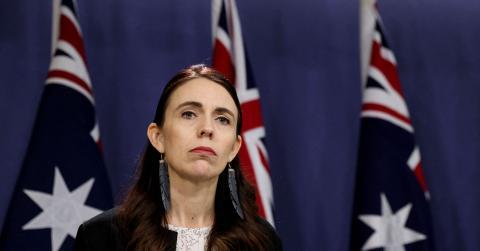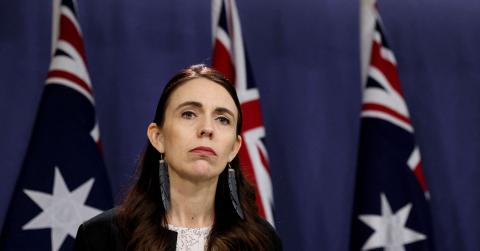
n the lush green grounds of New Zealand’s oldest university, prime minister Jacinda Ardern is getting mobbed.
Half a dozen police officers clear a path through the heaving crowd in Dunedin, while her security detail tightly flank Ardern, and look increasingly tense as the crowd gets bigger and more demanding.
Her detail are clearly surprised by the intensity of interest, and the crowd’s unwillingness to give up their chance at a brush – literally – with the PM.
Dressed in a maroon coat and bearing her trademark upbeat smile, her diminutive frame is swallowed up by the hundreds of students clamouring for a selfie, a hand-shake or a brief moment of connection.
Scenes of such approval for a political figure are unprecedented in New Zealand. In the year of mayhem that is 2020, Ardern’s ordinariness has become extraordinary; a balm after months of strangeness and change.
“Kia ora, Jacinda; thank you Aunty; hey there my sister!” students yell, as the windows of surrounding buildings open and staff and students lean out as far as they can to watch the hullabaloo. Some, on spotting the PM, ditch their workplaces and run down flights of stairs to join the throng.
Earlier, while announcing a climate change policy viewed in some quarters as somewhat disappointing, the gun-metal grey sky darkened to black, and thick raindrops began to fall. Ardern’s minders moved in with large umbrellas to shield her, but she brushed them aside.
“If you can get wet, I can get wet too!” she shouts at the crowd, who shout back their approval.
“I’m a really big fan of what Jacinda’s been doing in New Zealand, and I just wanted to see her and say thank you,” says Oscar Thomas, 20, a student at the university.
“I feel really inspired by her – she’s cool, calm and collected. She seems genuine. Someone recently called her a celebrity prime minister, but I don’t think it is necessarily a bad thing to idolise someone in that way if they are doing a much better job than everyone else.”
The Ardern brand
The general election is just one week away, and the Ardern brand is riding high in the polls, routinely clocking in at more than 50% as preferred prime minister.
The Labour party continues to poll 15 points above the opposition National party and is in with a fighting chance of governing alone – a rarity in New Zealand’s mixed-member proportional (MMP) election system, which is designed to install coalition governments.
Labour’s standing has been further boosted by the prime minister’s handling of the coronavirus crisis which, though it has plunged the country into a recession, has earned praise from observers. Other crises during her term include the mosque shootings of March 2018, the Whakaari White Island eruption in December last year.
The opposition leader, Judith Collins, has taken aim at Ardern’s “kindness” theme during the pandemic, saying the prime minister would offer voters only “love and a hug” in the wake of the global pandemic. Collins, meanwhile, would offer them “hope and a job,” she said, pledging a more robust economic response.
The prime minister has promised the strong polling numbers will not make her complacent, and so is dutifully traversing New Zealand on a somewhat contrived campaign trail.
Her demeanour is a marked shift from the 2017 election when she was a virtual unknown. Then, just seven weeks out from polling day, she had to convince Kiwis that at 37, she had the experience and gravitas to lead a country.
Now, at 40, with multiple disasters, a global pandemic and a toddler under her belt, she has no more convincing to do; and is only required to smile, emote and empathise on cue.
The ‘waffle factor’
However, there have been some problems – including the abandonment of the KiwiBuild policy to tackle the housing crisis, problematic ministers and accusations her Labour party has repeatedly failed to deliver a clear vision of its Covid-19 recovery strategy.
Businessman Bruce Bernasconi attended Collins’ speech at the Otago Chamber of Commerce in Dunedin the day after Ardern visited. He said he planned to vote for Collins. “All her answers were just so precise, there’s not a lot of waffle,” Bernasconi said. “Jacinda has celebrity status and sometimes she doesn’t stand for anything, you can’t get a straight answer out of her.”
It is this “waffle”, frequently commented on by political analysts following the leaders’ debates, that experts say is dangerous. Given the struggle to convey a post-Covid vision, the Labour party appears to be relying on Ardern’s star power to coast them through to a second term.
“Her brand is really riding high, people feel they have an international hero on Covid and they want to be part of that,” says Jennifer Lees-Marshement, an expert in political communication from Auckland university.
“It’s concerning when expectations get this high because you are always bound to disappoint. No leader is going to have an easy ride for the next year in New Zealand. And she still hasn’t articulated a clear vision, nor any clear policy agendas. It’s not clear what they’ve done and what they’re still planning to do.”
“She’s not trying to win a mandate, she’s not trying to win anyone over, so while this appears safe for Labour, it’s actually a very dangerous strategy.”
Leadership and likability
Ardern’s popularity with children and young people cannot be overstated. The prime minister has long stated that she entered politics to improve the lives of children, and her commitment to end child poverty has become the defining promise of her political career.
They gravitate towards the PM, and she makes time for each child, asking how the school holidays are and what subjects they enjoy. The warmth and likability that draw children in and make them feel at ease also seems to work with older voters.
“It’s pretty special what Jacinda is able to do; she really blends that leadership quality you need with being relatable, kind and down to earth. She’s relatable for common people,” says Tohunga Riwai, 21, a politics major.
“She’s not perfect, no leader is, but given a few more years to govern, I think she can really keep the progress of New Zealand up.”
Back in Dunedin, eating cheese rolls is a fixture of the New Zealand campaign trail, and come morning tea the Labour hikoi crowd into Hungry Hobbos on George street; ordering a dozen of the southern snacks.
Heading for the exit, one of Ardern’s press secretaries calls out loudly: “Did we pay?” as dozens of red-clad fans squeeze out of the door, letting in a blast of cold air.
Ardern throws up her hand, and shouts: “I paid!” before heading out into the grey streets, where her people are waiting in the rain.












